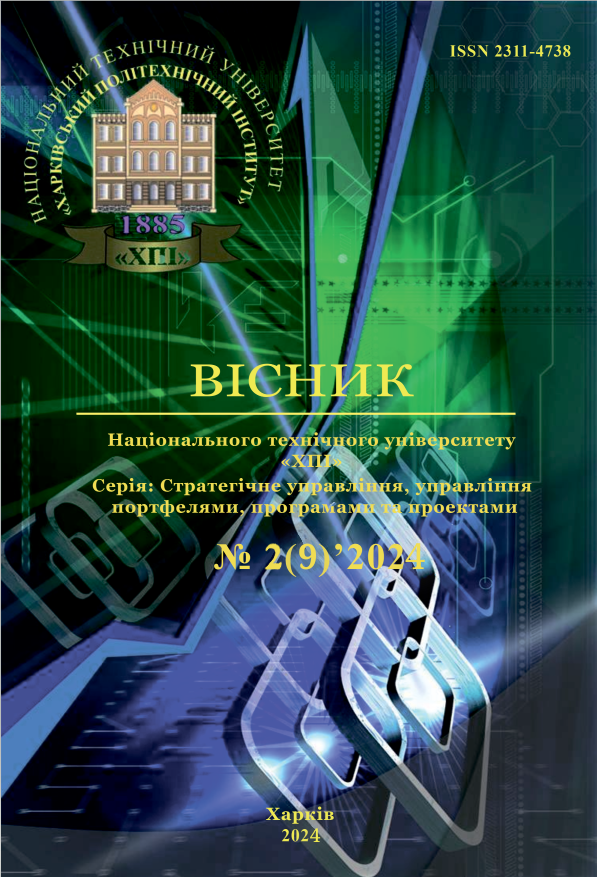THE EVOLVING LANDSCAPE OF EDUCATION UNDER THE INFLUENCE OF AI
DOI:
https://doi.org/10.20998/2413-3000.2024.9.1Keywords:
Artificial Intelligence, Education, Personalized Learning, Adaptive Learning, Ethical Considerations, Educational EquityAbstract
The subject of research explores the transformative impact of Artificial Intelligence (AI) on education, tracing its evolution and analysing its current and potential future implications. With the rapid advancements in AI technologies, education systems worldwide are undergoing significant changes, affecting teaching methodologies, learning experiences, and educational outcomes. This paper examines how AI is reshaping various aspects of education, including personalized learning, adaptive assessment, intelligent tutoring systems, and administrative tasks. Additionally, it discusses the ethical considerations, challenges, and opportunities associated with integrating AI into education. Through an interdisciplinary lens, this paper synthesizes insights from educational psychology, computer science, and pedagogy to provide a comprehensive understanding of the evolving landscape of education in the AI era. The result of the study offers recommendations for policymakers, educators, and researchers to harness the potential of AI while addressing its potential pitfalls, ensuring that education remains inclusive, equitable, and learner-centred in the digital age. Artificial Intelligence (AI) is rapidly transforming the educational landscape, prompting excitement and apprehension. This paper explores the potential of AI to revolutionize education by offering personalized learning, adaptive instruction, enhanced engagement, and automated feedback. The integration of AI also presents significant challenges regarding ethical considerations, teacher training, accessibility, and cost.
References
Chen, L., Chen, P. and Lin, Z. (2020) ‘Artificial Intelligence in Education: A Review’, IEEE Access, 8, pp. 75264–75278. DOI: 10.1109/ACCESS.2020.2988510.
Luan, H., Géczy, P., Lai, H., Gobert, J., Yang, S., Ogata, H., Baltes, J., Guerra, R., Li, P., & Tsai, C. (2020). Challenges and Future Directions of Big Data and Artificial Intelligence in Education. Frontiers in Psychology, Vol. 11. https://doi.org/10.3389/fpsyg.2020.580820.
Baek, C., & Doleck, T. (2020). A Bibliometric Analysis of the Papers Published in the Journal of Artificial Intelligence in Education from 2015-2019. International Journal of Learning Analytics and Artificial Intelligence in Education, 2, 67. https://doi.org/10.3991/ijai.v2i1.14481.
Zawacki-Richter, O., Marín, V., Bond, M., & Gouverneur, F. (2019). Systematic review of research on artificial intelligence applications in higher education – where are the educators?. International Journal of Educational Technology in Higher Education, 16. https://doi.org/10.1186/s41239-019-0171-0.
Paek, S., & Kim, N. (2021). Analysis of Worldwide Research Trends on the Impact of Artificial Intelligence in Education. Sustainability. https://doi.org/10.3390/SU13147941.
Zhai, X., Chu, X., Chai, C., Jong, M., Istenič, A., Spector, M., Liu, J., Yuan, J., & Li, Y. (2021). A Review of Artificial Intelligence (AI) in Education from 2010 to 2020. Complex., 2021, 8812542:1-8812542:18. https://doi.org/10.1155/2021/8812542.
Jebadurai, D., Dheenadayalan, M., & Chandrasekaran, D. (2023). Relevancy of Artificial Intelligence in Education: A Conceptual Review. Journal of Informatics Education and Research. https://doi.org/10.52783/jier.v3i2.322.
Dogan, M., Dogan, T., & Bozkurt, A. (2023). The Use of Artificial Intelligence (AI) in Online Learning and Distance Education Processes: A Systematic Review of Empirical Studies. Applied Sciences. https://doi.org/10.3390/app13053056.
Bushuyev, S. D., & Ivko, A. V. CONSTRUCTION OF MODELS AND APPLICATION OF SYNCRETIC INNOVATION PROJECT MANAGEMENT IN THE ERA OF ARTIFICIAL INTELLIGENCE Eastern-European Journal of Enterprise Technologies 3/3 ( 129 ) 2024 (р. 44–54) DOI: 10.15587/1729-4061.2024.306436.
Downloads
Published
Issue
Section
License
Copyright (c) 2024 Сергій Бушуєв, Андрій Пузійчук, Наталія Бушуєва, Вікторія Бушуєва, Денис Бушуєв

This work is licensed under a Creative Commons Attribution-NonCommercial-ShareAlike 4.0 International License.
Our journal abides by the Creative Commons copyright rights and permissions for open access journals.
Authors who publish with this journal agree to the following terms:
Authors hold the copyright without restrictions and grant the journal right of first publication with the work simultaneously licensed under a Creative Commons Attribution-NonCommercial-ShareAlike 4.0 International License (CC BY-NC-SA 4.0) that allows others to share the work with an acknowledgement of the work's authorship and initial publication in this journal.
Authors are able to enter into separate, additional contractual arrangements for the non-commercial and non-exclusive distribution of the journal's published version of the work (e.g., post it to an institutional repository or publish it in a book), with an acknowledgement of its initial publication in this journal.
Authors are permitted and encouraged to post their published work online (e.g., in institutional repositories or on their website) as it can lead to productive exchanges, as well as earlier and greater citation of published work.

